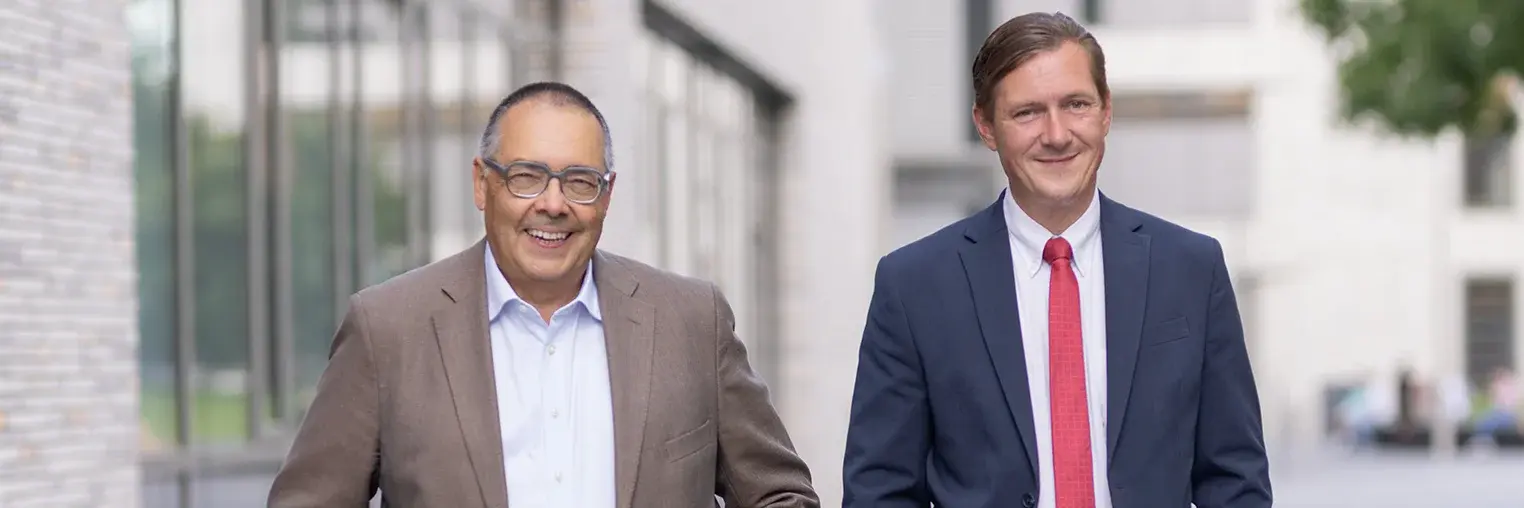
Sustainability in the Digital Age
TUM on the Heilbronn Campus Sets an Example at the COP28 World Climate Summit.
"We are committed to the goals of the United Nations to take responsibility for climate protection". With this clear signal, Prof. Dr. Helmut Krcmar, President's Representative for the Development of the TUM Campus Heilbronn, and Daniel Gottschald, Managing Director of TUM Campus Heilbronn gGmbH, traveled to the COP28 world climate conference in Dubai. It was important to both of them to build international bridges between countries, regions and scientific disciplines. In a world that is increasingly characterized by global challenges, TUM Campus Heilbronn is making its mark as a responsible, global university with sustainable future topics at international conferences – in Dubai, Davos and Heilbronn.
Focus on the Sustainable Development Goals (SDGs)
The 17 Sustainable Development Goals defined by the United Nations to achieve sustainable development on a global level by 2030 are an important guideline for the global community in the implementation of individual measures. They include the targeted promotion of high-quality education, affordable and clean energy, industry, innovation and infrastructure as well as sustainable consumption and production. "As TUM Campus Heilbronn, but also as part of the Bildungscampus with its unique ecosystem, it is our duty to contribute to achieving the SDGs – both locally and on the world stage," says Daniel Gottschald.
"As TUM Campus Heilbronn, but also as part of the Bildungscampus with its unique ecosystem, it is our duty to contribute to achieving the SDGs – both locally and on the world stage."
Sustainability for the digital age
The TUM Campus Heilbronn operates according to the principle "for the digital age" – also in terms of sustainability. "'Sustainability for the Digital Age' means that we recognize the importance of digitalization and use it to achieve the United Nations' Sustainable Development Goals (SDGs)," says Prof. Krcmar, adding that "we understand that technology and sustainability can go hand in hand. Examples of this include the use of artificial intelligence (AI) and CO2 monitoring to develop sustainable solutions." In the energy sector, for example, it is crucial that digitalization, management and technology merge. "This is the only way we can find innovative solutions that make our world more sustainable." He cites examples of sustainability in the platform economy, logistics efficiency and financing climate protection through energy transition. These are all topics that are being researched by chairs at the TUM Campus Heilbronn. The Bildungscampus and TUM in particular have a role model function here, because where else can they be observed, applied and passed on to the next generation in teaching with regard to sustainability.
Hydrogen as a game changer
"We see hydrogen as a real game changer in the debate about sustainable energy alternatives," says Prof. Krcmar. In a lecture in Dubai, he brought the Heilbronn-Franconia hydrogen region to the attention of the global community. Steps that have already been taken in advance as part of RegioWIN and Hydrogenium were discussed. "The establishment of a consistent ecosystem for hydrogen use was already very specifically about 'how and how quickly' – no longer about 'whether'," he said. In principle, both see the involvement of industry as the driving force behind the success of the implementation process for sustainable projects. Financing plays a key role in this. "That's why we also offer courses on sustainable finance at TUM Campus Heilbronn, for example, because climate protection through energy transition requires new financing mechanisms. In general, all transformation processes need to be financed," he says, referring to one of several relevant training courses that convey future-oriented content for companies.
Concrete measures and continuation of international cooperation
One thing is important to Daniel Gottschald: "Our responsibility does not end with words." The TUM Campus Heilbronn is therefore expecting a high-profile return visit from Dubai next year: "A delegation from science and public administration will work with us to consider what structures can be set up to achieve the sustainable development goals in concrete terms," he continues.
In addition, the two will continue their discussions on implementing the Sustainable Development Goals with representatives from science, business and politics at the World Economic Forum in Davos at the beginning of the year.
The Global Technology Forum at the TUM Campus Heilbronn in December of this year was a seamless addition to this. Leading scientists from top international universities spent two days discussing forward-looking topics, including sustainability. Together with the visit to COP28 and participation in the World Economic Forum in Davos, an exciting and relevant canon of projects is being created. As part of the global community, the TUM Campus Heilbronn and its stakeholders, consisting of students, researchers and administration, bear responsibility for the future. The promotion of sustainability and digitalization is actively practiced – sustainability for the digital age is a matter of course.